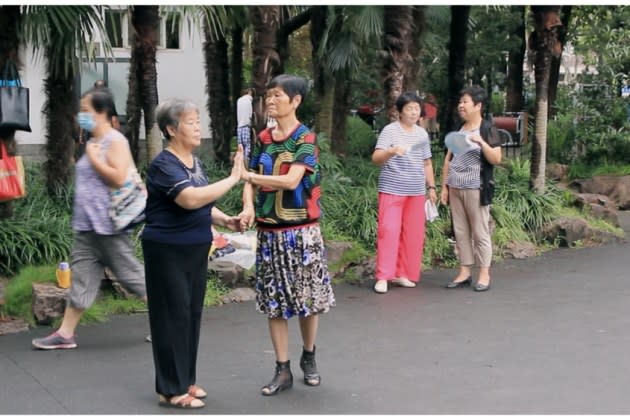Wang Jialai Makes It a Family Affair in ‘Paragate,’ Upcoming ‘La Revenante’: ‘By Recounting My Mother’s Story, I Can Finally Forge My Own’ (EXCLUSIVE)

It’s a family affair for filmmaker Wang Jialai, taking a closer look at her mother and grandmother in feature debut “Paragate,” now showing at documentary festival IDFA. But she is not done just yet. She is currently also developing a new hybrid documentary under the working title “La Revenante” (“The Revenant”).
“It talks about both of my parents and about their religion: My mother is a Buddhist and my father is a Christian. They are both very spiritual and I am trying to understand how they became this way. I think they both led a very difficult life, so they needed this spiritual support,” she reveals to Variety.
More from Variety
“At this point, my mother couldn’t live without religion. She has nothing else. The Goddess of Mercy [known as Guanyin] and her Buddhist master are her family now.”
In the new film, she is hoping to approach religion “from the inside,” Wang says.
“I want to create the kind of atmosphere that makes you think of a horror film. I was religious too in the past: after all, I grew up with my mother and was very influenced by her worldview. I know how it feels and what is going on in our heads. I no longer belong to that world, but I don’t want to ridicule it. It’s a way of expressing yourself. For my mother, it certainly is.”
In two-part “Paragate,” named after a Sanskrit expression meaning “gone to the other shore,” Wang tries to communicate with her mother and grandmother. At first, only via her smartphone with its cracked screen. When her grandmother dies, she returns to Shanghai, only to realize the relationship with her mother remains as strained as ever.
Produced by Julie Frères for Belgium’s Dérives, it’s co-produced by CBA and GSARA, with CBA also handling sales.
“It was tough, because I thought something would change, but it just wasn’t the case. When I got there, I was met with the same violence, same words as before. It was disappointing. I was hoping to find some love,” she admits.
“When I was still in Belgium and they were in China, we could talk more openly precisely because of that distance. It’s ironic, because my mother discussed things she would have never discussed in China. Usually, we tend to say that new technology deforms the way we communicate. But we could actually access a completely new place thanks to it.”
Wang didn’t set out to make a film about their decades-spanning struggles, she admits.
“I just wanted to understand. Understand the past, historical and political, understand their experiences and why they have done all these harmful things.”
“The Cultural Revolution [which lasted from 1966 to 1976, launched by Mao Zedong] destroyed many families in China. There is violence in our society and yet we don’t even consider some of these acts as violent. To us, they are just normal. My mother was abandoned by her mother, who lived at the time when so many people were experiencing extreme poverty and misery. It’s all linked.”
In the doc, as she wanders the streets of her old neighborhood, Wang talks to other people as well. And yet each time she ends up right where she started.
“I was looking for my grandmother’s traces, because no one would talk to me about her. My mother didn’t share any memories, so I tried to get them from other people and ultimately find my childhood again,” she notes. But after years spent abroad, she no longer belongs there.
“I realized I was an outsider now, despite my nationality and my mother tongue. I tried to have some tenderness in the film, though, because she is still my mother and China is still my country. I still have hope, also for our relationship to get better. But something has already been lost.”
During editing, Wang started to wonder if the images she intended to share with an audience weren’t too personal.
“I asked myself this question several times: ‘Is this too much?’ Especially when it comes to the images of my grandmother, who was dying. At first, I animated them instead, but I understood it was important to show them. I can’t really explain why.”
Her mother still has to see the finished film.
“Honestly, I don’t know if she will appreciate it. She knew what I was doing, but I am not sure how much of it she understood. I hope I can show it to her one day. I invited her to Amsterdam, but she didn’t want to come,” she says.
“How do I survive, making films that are so personal? Actually, that’s exactly how I survive. If I kept it all inside, I wouldn’t have made it. By recounting my mother’s story, I can try to finally forge my own.”
Best of Variety
Sign up for Variety’s Newsletter. For the latest news, follow us on Facebook, Twitter, and Instagram.

